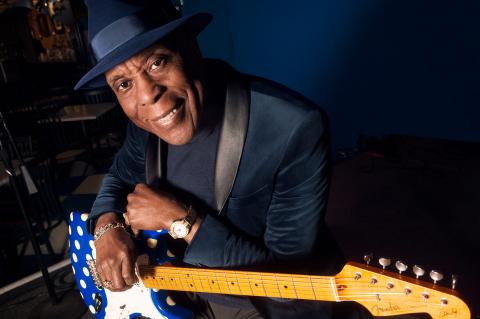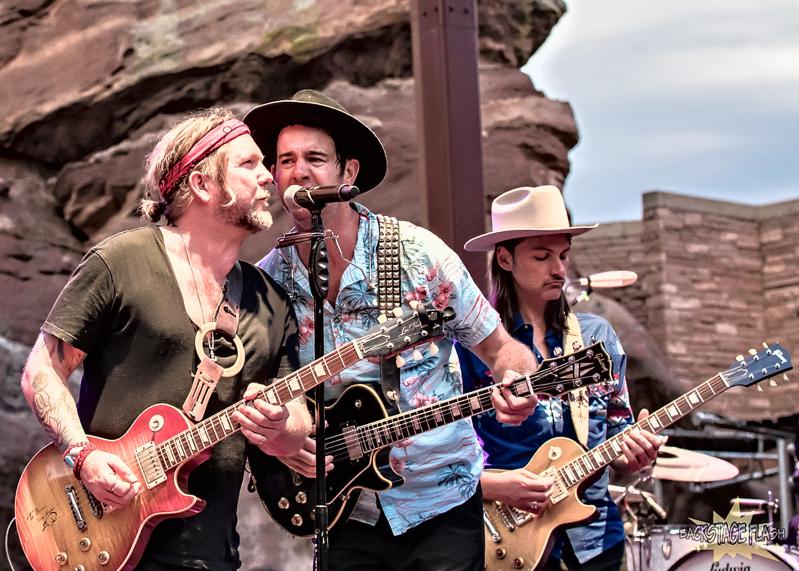The guitar, Richard Thompson said a year ago, “is still an exploration. There are always possibilities on the instrument. . . . It’s amazing how people have managed to bend the guitar in so many directions.”
“The guitar is the most popular instrument in the history of the world,” the guitarist G.E. Smith, who lives in Amagansett, said around the same time. “Because you can play chords and single-line melodies, it’s a great accompanying instrument, and it’s a great soloing instrument. It’s really the only instrument of its kind that you can do all that stuff with.”
How does one follow three nights of intimate performance by the legendary guitarists Andy Summers, Mr. Thompson, David Broza, and Badi Assad, with special guests including Billy Squier, Mr. Smith, and Ralph Gibson?
Do it all again, perhaps.

Guild Hall in East Hampton will celebrate the artistry of the instrument with the second annual Guitar Masters festival, starting Friday night when no less a master than Buddy Guy takes the stage at 8 p.m. On Saturday, the Allman Betts Band, featuring three guitarists as well as three sons of the Allman Brothers Band, takes over. On Sunday, another offspring of a legend, Roseanne Cash, will close out the festival with a band that includes the guitarist John Leventhal, who is also her husband.
Like the infinite bending of the sonic and stylistic possibilities to which Mr. Thompson referred, this year’s edition veers from last year’s course, which saw two Brits, an Israeli, and a Brazilian display a mind-boggling versatility and diversity. Accidentally or not, this year’s edition is strong on Americana, musicians simultaneously reaching back in time to push artistry forward.
The Louisiana-born Mr. Guy came of age in Chicago, where the gritty electric blues of the guitarists Earl Hooker, Magic Sam, and Otis Rush were as formative to the young man as B.B. King and Guitar Slim had been to him back in the country.

In a 2004 interview for a Billboard magazine article on the 50th anniversary of the Fender Stratocaster electric guitar, Mr. Guy told this reporter that “The first guy I heard playing the Stratocaster was Guitar Slim. Remember the record ‘The Things That I Used to Do’? I was in Baton Rouge, Louisiana.” The rock ’n’ roll prototype (Guitar Slim experimented with distortion long before Jimi Hendrix) was using fishing line for a strap and the back plate on his guitar was missing, “but man was he playing,” Mr. Guy said. “I said, ‘Who in the hell is this? That guitar he got there, man, is speaking like a human being!’ ”
An eight-time Grammy Award winner, Mr. Guy set out for Chicago on Sept. 25, 1957, and within a decade his blazing solos and guttural holler were lighting the path for young Englishmen like Jeff Beck and Eric Clapton, both of whom would mimic their demigod by wielding their own Stratocasters. “They said that’s what turned them around,” he said. “They didn’t think a Strat could play blues. All they had heard was the country and western stuff.”
The electric blues of Mr. Guy and his forebears can be heard, along with a melange of influences, woven throughout “Down to the River” by the Allman Betts Band, which was released on Friday. Recorded live to analog tape at the famed Muscle Shoals Sound Studios in Alabama, “Down to the River” is chock full of muscular riffs, soaring electric slide guitar, first-rate songwriting, and some vocals uncannily reminiscent of the late Gregg Allman.
The progeny of the Allman Brothers Band are more than their father’s sons: Much of “Down to the River” reminds this listener of early 1990s Black Crowes, whose twin-guitar attack reached back to bluesy British rock ’n’ rollers like the Faces, Humble Pie, and the Rolling Stones — and, yes, the Allmans — but it’s more than that.
“We’re music fans from way, way back,” said Devon Allman, son of Gregg, “not because of who our dads are.” He listed players including Carlos Santana, David Gilmour, Mark Knopfler, and Jimi Hendrix among his influences. And, inevitably, “seeing Dickey play every night was huge for me.”
That would be Dickey Betts, a founding guitarist of the Allman Brothers Band. “Hendrix, the Doors,” listed Duane Betts, son of Dickey, apparently named after Devon’s uncle, Duane Allman, who recorded and performed with the likes of Aretha Franklin, Wilson Pickett, King Curtis, and Derek and the Dominoes with the Allman Brothers Band. He died in a motorcycle accident at age 24 in 1971.
“But at the same time,” Mr. Betts added, “Run-D.M.C., Van Halen, the Beastie Boys. Later, I went through a metal phase, and when grunge came in, was into a lot of that stuff. But I was listening to a lot of stuff: By the time I was 15, I was listening to bluegrass, John Coltrane, Albert King, and was listening to Smashing Pumpkins, Nirvana.” He also referred to his friend Marc Ford, formerly of the Black Crowes and presently with its offshoot, the Magpie Salute, and Mick Taylor, best known for a long stint in the Rolling Stones.
“To be honest, going back to the source, it’s Duane,” said Johnny Stachela, the third guitarist in the Allman Betts Band. “That really ignited the fire for me — really digging into the music they were listening to, and working backwards from there, discovering all the blues. I’m still discovering guys that inspire me now, from the past and present. Duane, Ry Cooder. For slide, George Harrison, Lowell George. There’s such a wide range of influences we all have.”
The guitar, Mr. Allman said, “is so expressive. You try your best to make it sing, or talk. That’s something that not many instruments can really do. By virtue of bending the string, having that linear quality to the bend . . . I think that’s what makes it great, magical, mystical. You can make it sing, talk, scream, shout.” (The multitude of influences notwithstanding, the late Duane Allman surely casts a long shadow: The Allman Betts Band also includes Berry Duane Oakley, son of the Allman Brothers’ founding bassist, the late Berry Oakley.)
On “She Remembers Everything,” released last November, Ms. Cash “sounds fresh and vital on every track,” according to the website allmusic.com, and “the music clearly speaks of experience and maturity.” The album “is the work of a musician and songwriter who knows her craft inside and out, and her lyrical voice is full of compassion and lacking in fear or hesitancy.”
While he simultaneously worked on Ms. Cash’s “Rules of Travel,” which features one of the last performances by her father, Johnny Cash, and Joan Osborne’s “How Sweet It Is,” Mr. Leventhal told this reporter in a 2002 interview that “When I was a kid, music totally transported me. I would play a song like [the Beatles’] ‘I’ll Be Back’ over and over — I couldn’t go to school without hearing it.” He expressed a similar affection for Sly and the Family Stone, who Ms. Osborne covered on “How Sweet It Is.” “I love those Sly records for the same reason I like the Beatles’ records — their strange quirkiness, and the nontraditional way he approaches arranging.”
“It goes without saying,” Mr. Stachela said. “Musicians are the biggest fans of music out there. We love it so much, we’re constantly taking it in. It’s so important to expose yourself to all kinds of music, and I have this thing inside me that makes me want to understand what they’re doing, and learn how to do it. That’s how you grow as musicians, and that started from Day One.”
Tickets, which range in price from $45 to $150, may be purchased on the Guild Hall website or through the box office.

